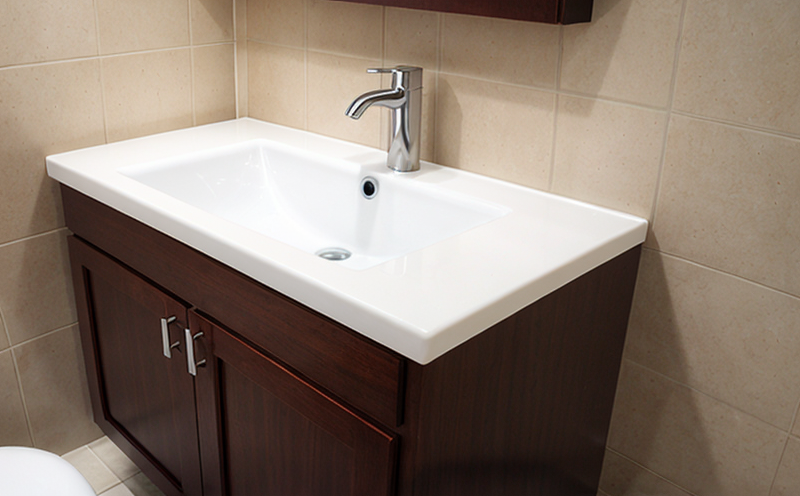NF EN 14516 Bathtub Performance Testing of Plastic Materials
The NF EN 14516 standard is a European harmonized standard designed to ensure the performance and safety of plastic materials used in bathtub applications. This testing procedure evaluates various aspects of bathtub integrity, including resistance to physical stress, chemical stability, durability under thermal conditions, and dimensional stability over time.
Understanding the significance of this test requires recognizing its role within the broader context of polymer and plastics testing for bathroom and sanitary products. The standard aims to ensure that materials used in bathtubs meet strict performance criteria, which is critical for consumer safety and product longevity. Compliance with NF EN 14516 can also impact a manufacturer's reputation and market competitiveness.
The testing procedure itself involves several key steps, starting from the preparation of the specimens. Specimens made from plastic materials are subjected to a series of tests that simulate real-world conditions they might encounter in use. These include mechanical loading to assess strength and durability under pressure, exposure to chemicals commonly found in household environments, and thermal cycling to evaluate dimensional stability.
One of the most important aspects of this testing is ensuring precise specimen preparation. This includes cutting samples to specified dimensions and accurately conditioning them before testing. The accuracy and consistency of these preparations directly affect the reliability of the test results. Once prepared, the specimens undergo a range of tests that include:
- Compression tests to evaluate resistance to deformation under pressure.
- Tensile strength tests to measure how much force is required to pull the specimen apart.
- Bending tests to assess flexibility and resilience without cracking or breaking.
Chemical stability testing ensures that the plastic materials do not react adversely with household cleaning agents, detergents, or other chemicals. This helps in maintaining the integrity of the bathtub over its lifetime. Thermal cycling involves exposing the specimens to alternating high and low temperatures to simulate environmental conditions that can cause thermal expansion and contraction.
The results from these tests provide critical data on the performance characteristics of the plastic materials used in bathtubs. These data are then analyzed against the specified acceptance criteria outlined in NF EN 14516. Compliance with these standards not only ensures product safety but also enhances consumer confidence, which is vital for brand reputation and market success.
For manufacturers and quality managers, ensuring compliance with NF EN 14516 can significantly enhance their products' performance and reliability. By adhering to this standard, they demonstrate a commitment to excellence in material selection and manufacturing processes. This can lead to increased trust among consumers and improved market positioning.
Why Choose This Test
- Precision Specimen Preparation: Ensures accurate and consistent testing results, which are crucial for reliable data interpretation.
- Variety of Testing Methods: Comprehensive evaluation through mechanical loading, chemical stability tests, and thermal cycling to cover all potential real-world stresses.
- Compliance Assurance: Meeting NF EN 14516 ensures that products meet stringent European standards, enhancing marketability and consumer trust.
- Enhanced Product Lifespan: By identifying weaknesses in material performance early, manufacturers can improve the durability of their products.
Selecting this test allows companies to gain a competitive edge by ensuring their products meet or exceed industry standards. It also helps in identifying areas for improvement and innovation within product development cycles.
Customer Impact and Satisfaction
The impact of NF EN 14516 compliance extends beyond just the manufacturing process; it directly affects the end-user experience. Consumers benefit from products that are safe, durable, and reliable, which enhances overall satisfaction and trust in the brand.
- Enhanced Safety: Compliance with this standard ensures that bathtubs made of plastic materials meet stringent safety requirements, reducing the risk of accidents or injuries.
- Durable Performance: The tests conducted under NF EN 14516 help in identifying and addressing potential issues early on, leading to longer-lasting products.
- Increased Trust: By adhering to international standards like NF EN 14516, manufacturers build a reputation for quality and reliability, which is crucial for long-term customer loyalty.
In essence, choosing this test not only benefits the manufacturer but also contributes positively to the end-user experience by providing safer, more durable products that meet high standards of performance and safety.
Use Cases and Application Examples
The NF EN 14516 standard is applicable in various scenarios where plastic materials are used in bathtub applications. Some common use cases include:
- New Product Development: Ensuring that new designs meet the latest performance standards.
- Quality Assurance: Regular testing to maintain consistent product quality and identify any issues before they impact the market.
- Compliance Verification: Verifying compliance with international standards for export markets or regulatory bodies.
An example of an application could be a manufacturer developing a new type of bathtub that uses recycled plastic materials. By conducting NF EN 14516 tests, they can ensure the durability and safety of their product while also demonstrating environmental responsibility through the use of recycled materials.
In another instance, a company might need to verify that its existing products meet updated standards due to changes in material science or consumer expectations. Conducting these tests provides valuable insights into whether modifications are necessary to maintain compliance and enhance performance.





